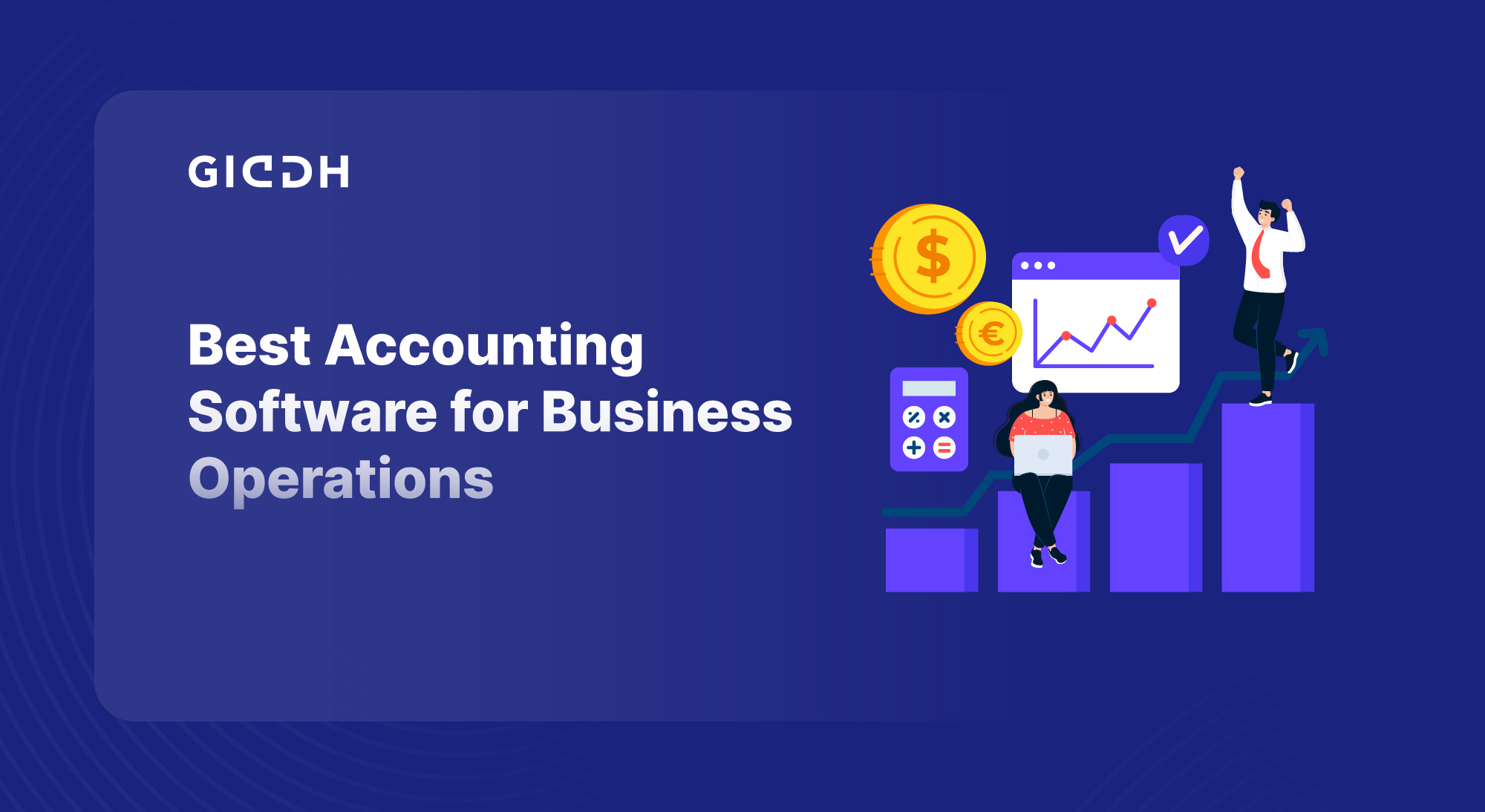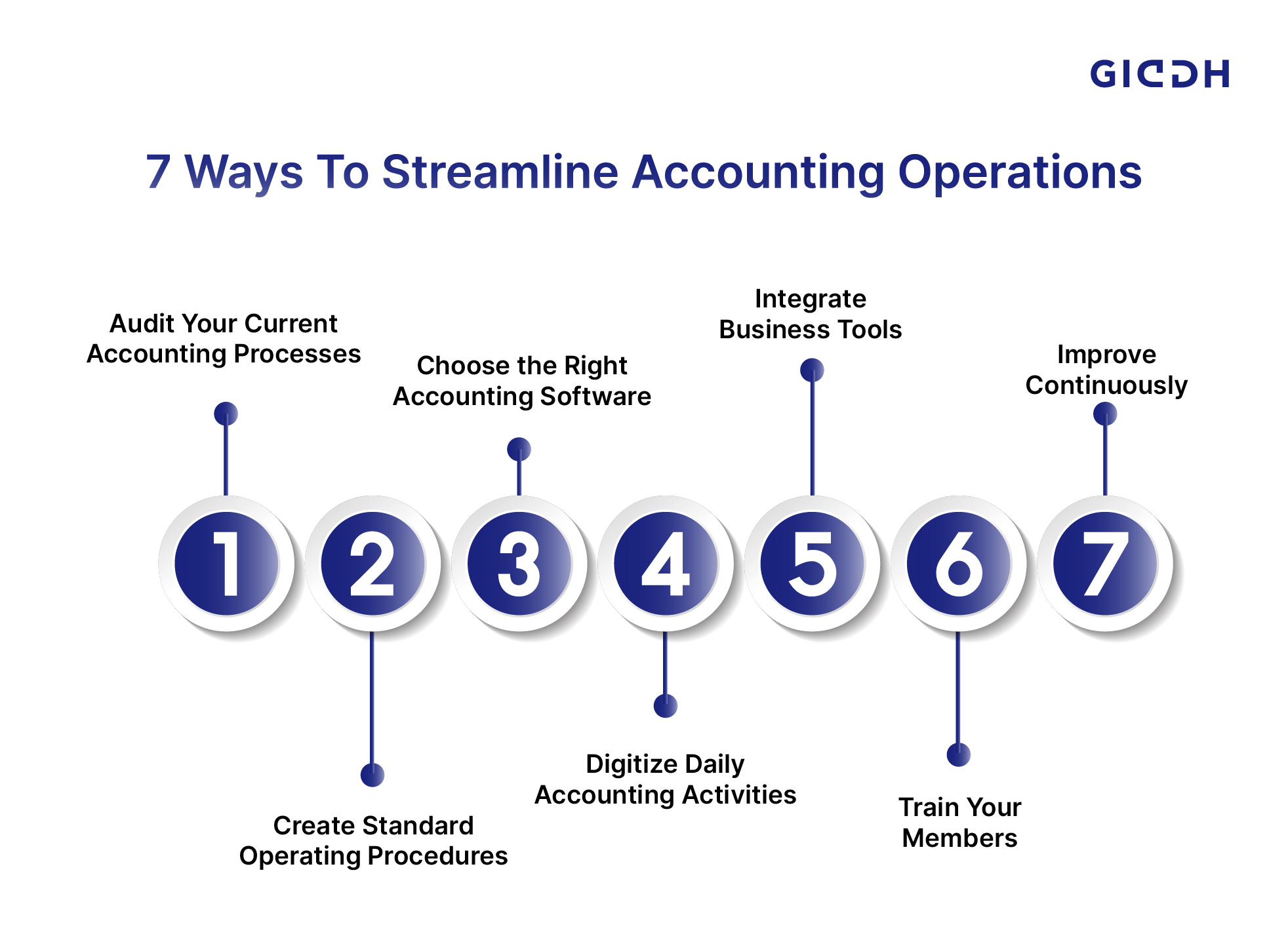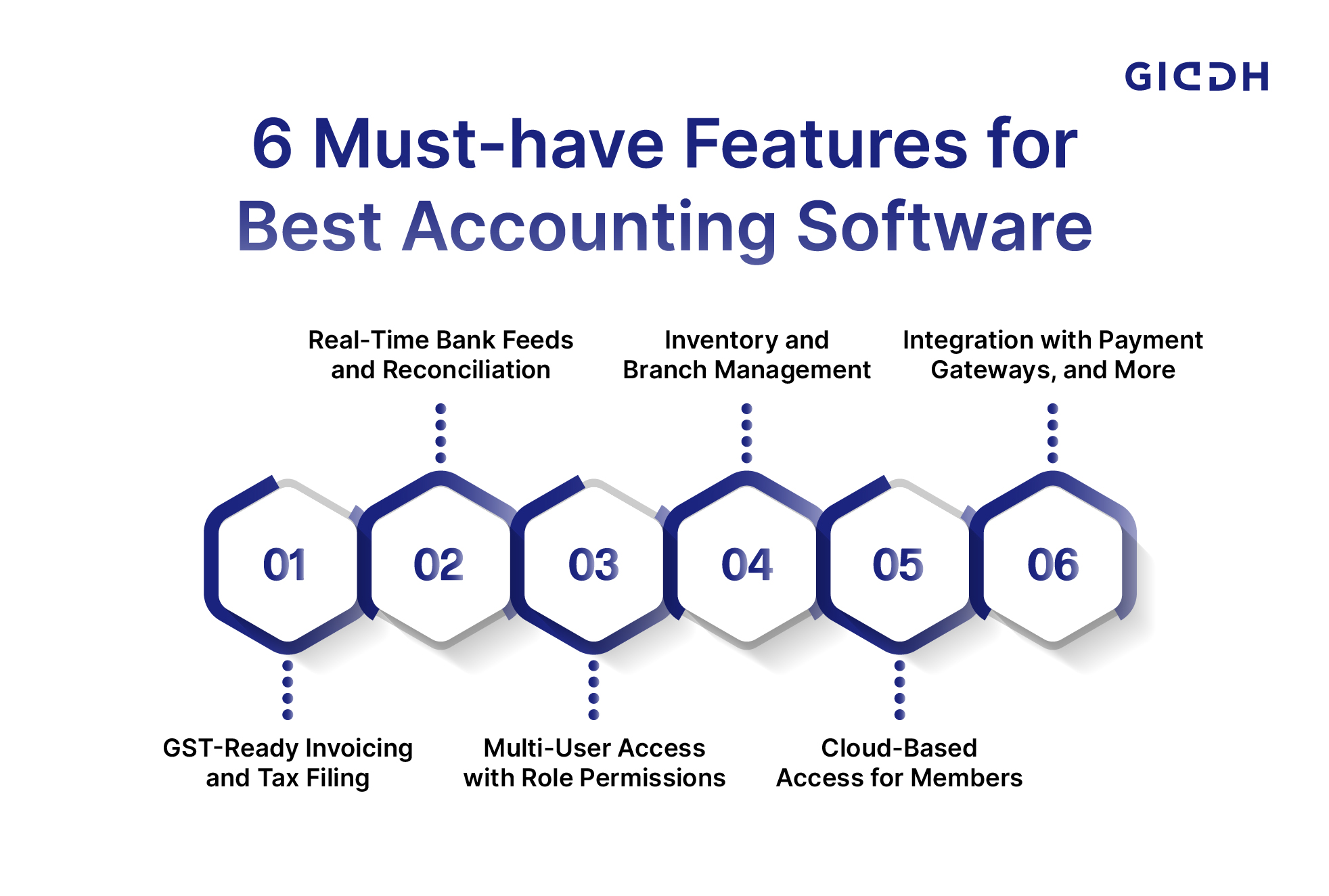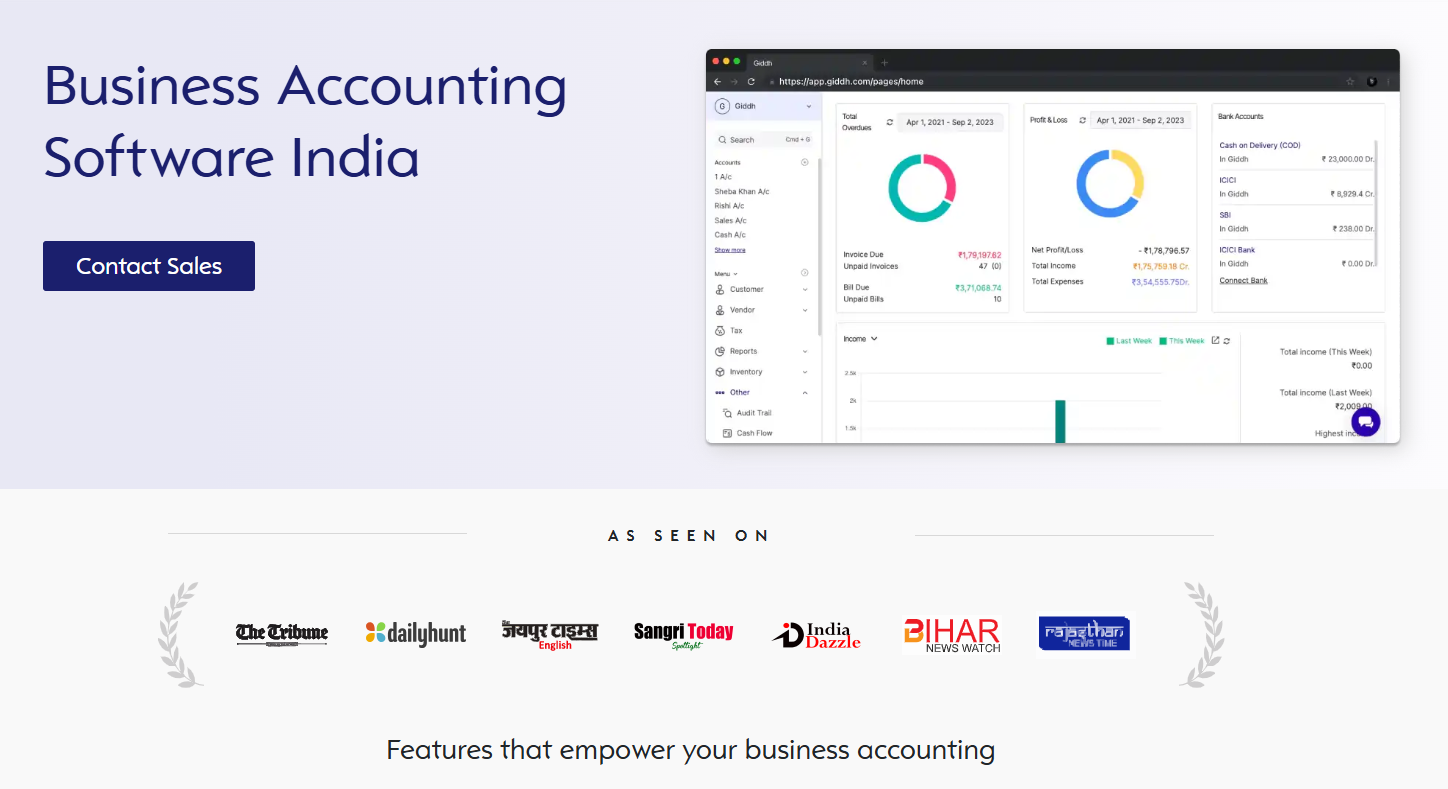How to Streamline Business Operations with the Best Accounting Software

According to a report by AutoRek, 90% of small businesses in India still rely on spreadsheets for managing finances, which often leads to scattered data, delayed invoicing, and missed tax payments. These common problems can have a significant impact on your cash flow and overall business efficiency.
But what if a tool could bring all your numbers together, automate tedious tasks, and help you stay on top of tax deadlines? Imagine having a financial control room where everything is streamlined, from real-time reporting to automated invoicing. The best accounting software for businesses offers just that. It consolidates your financial data, ensures compliance, and helps you make timely, data-driven decisions.
If you're tired of juggling multiple spreadsheets and systems, it’s time to simplify your accounting with the right tool.
What It’s Costing You (And Signs You’ve Outgrown Spreadsheets)
Relying on spreadsheets for your business accounting might seem like an affordable option, but it’s costing you more than you think. As your business grows, the limitations of manual accounting become more apparent, and the risks escalate.
-
Manual Reconciliation Errors: Human errors in spreadsheets lead to costly discrepancies, wasting time and damaging financial accuracy.
-
Delayed Reporting During Audits: Without real-time data, audits are slow and stressful, delaying critical decisions.
-
No Access Control or Team Collaboration: The absence of effective access control and team collaboration features hinders the ability to track changes and safeguard sensitive data.
-
Lack of Integration with GST, Inventory, or CRM Tools: Manual entry of data from various systems increases errors and inefficiencies.
As your business grows, these issues become more pressing. Switching to the best accounting software for businesses can help you streamline operations and avoid these costly problems.
How to Streamline Accounting Operations

Efficient accounting is crucial for the growth and sustainability of any business. Streamlining your accounting operations helps save time, reduce errors, and ensure compliance. Here are the steps to achieve a more efficient accounting process:
1. Audit Your Current Accounting Processes
Begin by reviewing your current accounting operations. Identify inefficiencies, manual errors, and areas that cause delays. Understanding your current workflow will help you make informed decisions about what needs improvement and what can be automated.
-
Identify bottlenecks in your workflow.
-
Recognize areas prone to error.s
-
Prioritize improvements based on impact.
2. Create Standard Operating Procedures (SOPs)
Standard Operating Procedures (SOPs) are essential to ensuring consistency and reducing errors. Define a straightforward process for each accounting task, such as invoicing, bank reconciliation, and reporting. SOPs provide a framework for your team to follow, improving accuracy and efficiency.
-
Document processes for every task
-
Ensure uniformity across the team.
-
Update procedures regularly to reflect changes.
3. Choose the Right Accounting Software
The Best Accounting Software for Businesses plays a pivotal role in streamlining accounting operations. Look for software that automates repetitive tasks, such as invoicing, bank reconciliation, and tax filing. Ensure it integrates with your existing tools and supports real-time reporting.
-
Automates time-consuming tasks like invoicing
-
Provides real-time financial reporting
-
Integrates with existing business systems (CRM, payment gateways)
4. Digitize Daily Accounting Activities
Manual processes, such as paper invoicing and manual data entry, can lead to errors and inefficiencies. Switch to digital tools that automate these daily tasks. Use cloud-based accounting software to access your financial data from anywhere and ensure it’s always up to date.
-
Replace paper invoicing with digital systems.
-
Automate data entry to reduce manual errors.
-
Use cloud accounting for real-time updates.
5. Integrate Business Tools
Integrating your accounting software with other business tools, such as inventory management, CRM, and payment gateways, ensures a seamless flow of data. This integration helps eliminate duplication of efforts and enhances overall business efficiency.
-
Connect accounting software with inventory and CRM tools.
-
Sync payment gateways for smoother transactions.
-
Improve data accuracy and reduce manual entry.
6. Train Your Members
Invest in training your team members to use the accounting software effectively. Ensure they understand the software's features and best practices for handling daily tasks. Well-trained employees are crucial for maintaining efficiency and accuracy.
-
Provide comprehensive training for the team.
-
Focus on the most essential features and functions.
-
Regularly refresh training to ensure continued effectiveness.
7. Monitor and Improve Continuously
Continuously monitor your accounting processes to identify areas for improvement. Regularly review your workflows, software features, and team performance. Adapt to changes in tax regulations or business needs to ensure your accounting operations remain streamlined.
-
Regularly evaluate software performance.
-
Adjust workflows as needed to improve efficiency.
-
Stay updated with changes in tax laws and regulations.
By following these steps, you’ll set your business up for better financial management, improved efficiency, and timely decision-making with the best accounting software for businesses.
Top Features to Look for in Accounting Software

Alt Text: Features for Best Accounting Software For Businesses
Choosing the Best Accounting Software for Businesses means considering features that streamline operations and enhance efficiency. Here are the top features to prioritize:
-
GST-Ready Invoicing and Tax Filing:
Ensure your accounting software supports GST-compliant invoicing and simplifies tax filing. This feature saves time and reduces the risk of errors, keeping your business compliant with government regulations.-
Reduces manual errors in tax calculations.
-
Streamlines tax filing for faster compliance.
-
Ensures GST-compliant invoicing for smoother audits.
-
-
Real-Time Bank Feeds and Reconciliation:
Linking your bank account to your accounting software enables automatic updates of transactions. Real-time bank feeds help ensure that your records are always accurate, making reconciliation faster and easier.-
Syncs bank transactions automatically.
-
Helps identify discrepancies quickly.
-
Speeds up reconciliation with up-to-date data.
-
-
Multi-User Access with Role Permissions:
As your business grows, your accounting needs become more complex. Multi-user access with customizable role permissions ensures that only authorized team members can view or edit sensitive financial data, enhancing security.-
Assign roles to control access.
-
Protects sensitive financial data.
-
Allows secure collaboration across teams.
-
-
Inventory and Branch Management:
For businesses dealing with products, inventory management is crucial. Look for software that tracks stock levels, handles multiple warehouses or branches, and integrates with sales orders to prevent stock-outs or overstocking.-
Tracks stock in real-time across locations.
-
Helps avoid inventory shortages or excess.
-
Improves order management and fulfilment.
-
-
Cloud-Based Access for Members:
Cloud-based software enables your team to access financial data from anywhere, at any time, thereby reducing the need for physical infrastructure and providing flexibility.-
Enables remote access from any device.
-
Reduces reliance on physical storage.
-
Provides flexibility for a distributed team.
-
-
Integration with CRM, Payment Gateways, and More:
Seamless integration with your existing tools, like CRM systems and payment gateways, ensures smooth data flow across all business functions, making financial management more efficient.-
Automates data syncing across systems.
-
Saves time on manual data entry.
-
Enhances accuracy and coordination between systems.
-
These features will help you scale your business smoothly and efficiently with the Best Accounting Software for Businesses.
How Giddh Helps Indian Businesses Streamline Accounting
Giddh offers the Best Accounting Software for Businesses, designed to help Indian companies streamline their financial operations. With a wide range of features tailored to the needs of growing businesses, Giddh ensures smooth and efficient accounting management.
Key Features of Giddh:
-
GST-Ready Invoicing and Tax Filing: This feature significantly reduces the risk of errors and helps you avoid penalties by streamlining tax filing processes.
-
Real-Time Bank Reconciliation: Real-time bank feeds make it easier to reconcile accounts, helping you maintain accurate financial records with minimal effort.
-
Unlimited User Access: It allows you to control who can view or edit sensitive information, ensuring your financial data remains secure.
-
Inventory and Branch Management: Giddh offers comprehensive features that allow you to track stock levels in real-time across multiple warehouses or branches, integrating seamlessly with sales orders to prevent stock-outs or overstocking.
-
Cloud-Based Access for Members: It eliminates the need for physical infrastructure and provides your business with flexibility to manage finances remotely.
-
Integration with CRM, Payment Gateways, and More: This synchronization across systems ensures a smooth workflow and reduces the need for manual data entry, saving you time and increasing accuracy.
Some Other Features of Giddh:
-
Multi-Currency Support: Easily handle transactions in different currencies, making it perfect for businesses with international dealings.
-
White-Label Option: Customize Giddh’s interface to reflect your brand, providing a personalized experience for your team.
-
Asset Management: Track and manage your business’s assets efficiently to keep your financial records in order.
-
Ledger-Based Accounting: Manage accounts efficiently with one-step ledger entries, reducing manual errors and improving accuracy.
-
Manage Over 100 Companies: Handle accounting for multiple companies under a single Giddh account, perfect for growing businesses.
-
Invoice Management: Streamline invoicing processes with automated GST-compliant invoicing, reducing manual work and errors.
With these features, Giddh makes managing finances easier, more accurate, and time-efficient.
How to Choose the Right Accounting Software for Your Business
Selecting the Best Accounting Software for Businesses can be overwhelming, but with the proper criteria, it becomes much easier. Use the following checklist to ensure you choose the software that fits your business needs:
-
Do you need remote access?
If your team works from different locations or if you travel frequently, cloud-based accounting software that offers remote access is essential. It ensures you can manage your finances from anywhere, at any time. -
Do you handle GST and multi-currency?
For Indian businesses, GST-compliant software is a must to stay compliant with tax laws. Additionally, if you deal with international clients or suppliers, look for software with multi-currency support to simplify transactions and reporting. -
Do you manage multiple clients or branches?
If your business oversees multiple clients, locations, or branches, look for software that allows you to manage accounts for more than one company under a single account. This feature will save time and improve organization. -
Is reporting and inventory tracking a priority?
Effective reporting and inventory management are crucial for businesses dealing with products or services. Choose software that provides real-time reporting and seamless inventory tracking to streamline operations and decision-making.
By addressing these points, you can select the Best Accounting Software for Businesses that aligns with your needs, improving efficiency and supporting growth.
Wrapping Up
Switching to the Best Accounting Software for Businesses early can save you from the headaches of outdated systems, manual errors, and inefficient processes. The longer you delay, the more challenges will accumulate, impacting your business growth, compliance, and overall financial health. It's essential to make the switch before minor issues turn into major problems.
By adopting a reliable accounting solution like Giddh, you can simplify your financial operations, automate tedious tasks, and gain better control over your business. A seamless, accurate, and efficient accounting system is no longer a luxury but a necessity for growth and sustainability in today’s competitive market.
Start by exploring a free tool like Giddh, which offers a comprehensive suite of features to streamline your accounting processes. Testing out the software will allow you to experience its benefits firsthand and see how it can improve your efficiency and accuracy.
Start your free trial with Giddh and simplify your accounting today.
FAQ
What is the most essential feature to look for?
The most essential feature in accounting software is real-time reporting and automation. It helps reduce manual errors, streamline processes, and provide instant insights for better decision-making. Look for features like GST-compliance, multi-currency support, and bank reconciliation for added convenience.
Is cloud-based software safe for sensitive data?
Yes, cloud-based software is safe for sensitive data when it follows strong security standards, like encryption, multi-factor authentication, and data backups. Providers like Giddh implement robust security measures to ensure that your financial information is protected.
Can accounting software reduce compliance risks?
Yes, accounting software can significantly reduce compliance risks. It automates GST filings, tax calculations, and reporting, ensuring your business remains compliant with local regulations and tax laws, preventing costly penalties.
How long does it take to learn Giddh or similar tools?
Giddh and similar tools are designed to be user-friendly. Most users can learn the basics within a few hours to a day, especially with the help of tutorials and customer support. Advanced features may take a little longer, but remain easy to navigate.



